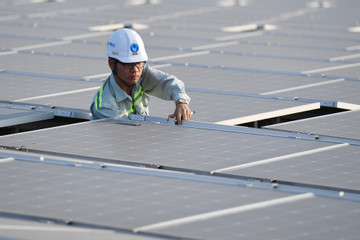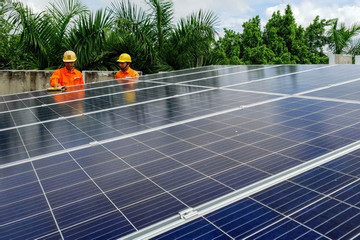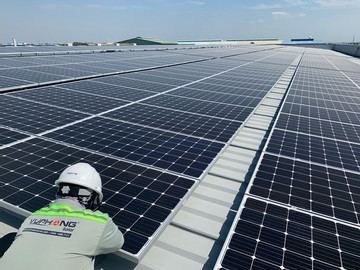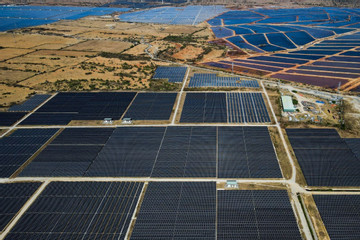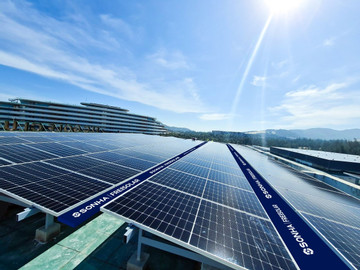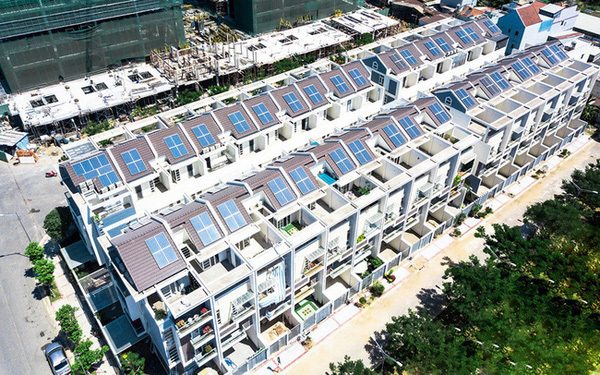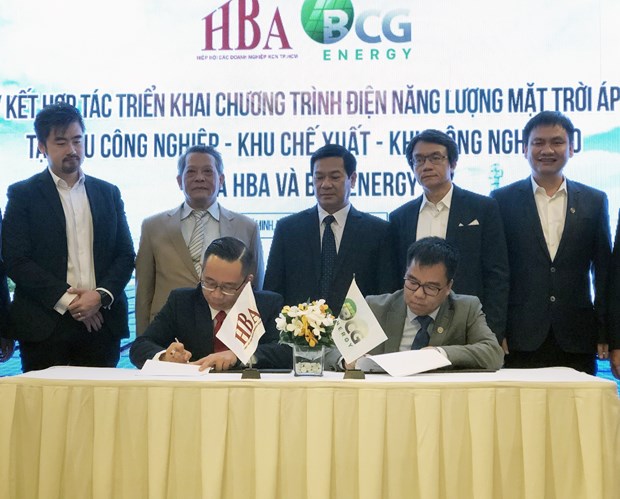- © Copyright of Vietnamnet Global.
- Tel: 024 3772 7988 Fax: (024) 37722734
- Email: evnn@vietnamnet.vn
rooftop solar power
Update news rooftop solar power
Policy needed to encourage rooftop solar-power development
Policies that encourage rooftop solar power are needed as demand has increased from households, agencies and businesses in the north, said Deputy Prime Minister Tran Hong Ha.
Deputy PM orders policy for rooftop solar power development
Deputy Prime Minister Tran Hong Ha on August 13 stressed the significance of consistency in the technical approach as well as economic efficacy while developing a decree on mechanisms and policies to develop rooftop solar power.
Rooftop solar power expected to see growth as new decree underway
According to the plan, Vietnam Electricity will pay for the surplus energy from the local solar power system to the national grid in alignment with the average market electricity price of the previous year.
Rooftop solar power systems allowed to sell 10-20% of capacity to national grid
The Ministry of Industry and Trade (MOIT) has been asked to design a plan to allow northern rooftop solar power systems to sell up to 20 percent of their capacity to the national grid.
MOIT refutes criticism about its attitude toward rooftop solar power
Replying to a comment that rooftop solar power policies are too changeable, the Ministry of Industry and Trade (MOIT) said that it has strictly pursued the government’s instructions to create a decree on rooftop solar power development.
Rooftop solar power to reduce costs: Ministry
The Ministry of Industry and Trade (MOIT) has been consistent in its view that the major goal of rooftop solar power is self-sufficiency for users, not sales for profit.
Red River Delta, Southeast Region need NA approval for rooftop solar development
In a significant move towards regulating energy initiatives, the Red River Delta and Southeast regions face a new mandate: they must seek approval from the National Assembly to pursue rooftop solar power projects.
MOIT seeks zero-dong pricing for rooftop solar power price
Minister of Industry and Trade Nguyen Hong Dien believes that paying zero dong to electricity to be generated by rooftop solar power systems is a reasonable policy which could prevent profiteering.
VCCI proposes power transactions between residents living in same buildings
VCCI has proposed that the Ministry of Industry and Trade (MOIT) amend current regulations and allow clients in the same buildings to sell or buy rooftop solar power directly to each other without transmitting electricity through the national grid.
VN government procures rooftop solar power at zero cost: Draft decree
Any excess energy can be supplied to the grid, but the government only purchases it at a rate of zero dong.
Rooftop solar-power policy criticized for focusing on residential buildings
The draft encourages installation of rooftop solar power systems on people’s homes and office buildings, but does not encourage them for industrial zones, schools, hospitals, airports, seaports, railway stations and bus stations.
Rooftop solar power systems may go bankrupt under new requirement
Many rooftop solar power investors have been told to submit construction permits to legalize their projects.
Rooftop solar power projects encounter many difficulties
Responding to the Government's policy of encouraging the development of solar power, many businesses across the country have invested in solar power. Ironically, many investors now have to worry about debts piling up.
Solar power: state agencies loosens management, businesses commit violations
The Ministry of Industry and Trade (MOIT) has come to several conclusions after its review of issues related to rooftop solar power development.
Many rooftop solar power projects camouflage as farms in Central Highlands
To energize before December 31, 2020, to enjoy preferential prices, many enterprises in the Central Highlands had sought every way to speed up the construction of rooftop solar power projects, despite violations in land use, construction,
PM orders review of solar power development-related issues
Prime Minister Nguyen Xuan Phuc has asked the Ministry of Industry and Trade (MoIT), localities and Vietnam Electricity Group (EVN) to review issues related to Vietnam’s solar power development.
Desire for long-term tactics in solar power
Although Vietnam began to develop solar power plants just about three years ago, the initially achieved capacities have been outstanding.
HCM City targets 1,000 MWp of rooftop solar power at industrial zones by 2024
 HCM City aims to have 1,000 MWp of rooftop solar power capacity installed by 2024 in its industrial parks, export processing zones and high-tech parks, up from 700MWp now.
HCM City aims to have 1,000 MWp of rooftop solar power capacity installed by 2024 in its industrial parks, export processing zones and high-tech parks, up from 700MWp now.
Is it time for rooftop solar power?
 Industrial zones as well as supermarkets and large real estate developers have begun designing rooftop solar power systems for their new projects.
Industrial zones as well as supermarkets and large real estate developers have begun designing rooftop solar power systems for their new projects.
Over 1,000 firms in HCM City to develop rooftop solar power
 More than 1,000 businesses located at processing, industrial and hi-tech parks in Ho Chi Minh City are set to have solar panels installed on their rooftops in the next few years in an effort to promote green development.
More than 1,000 businesses located at processing, industrial and hi-tech parks in Ho Chi Minh City are set to have solar panels installed on their rooftops in the next few years in an effort to promote green development.







